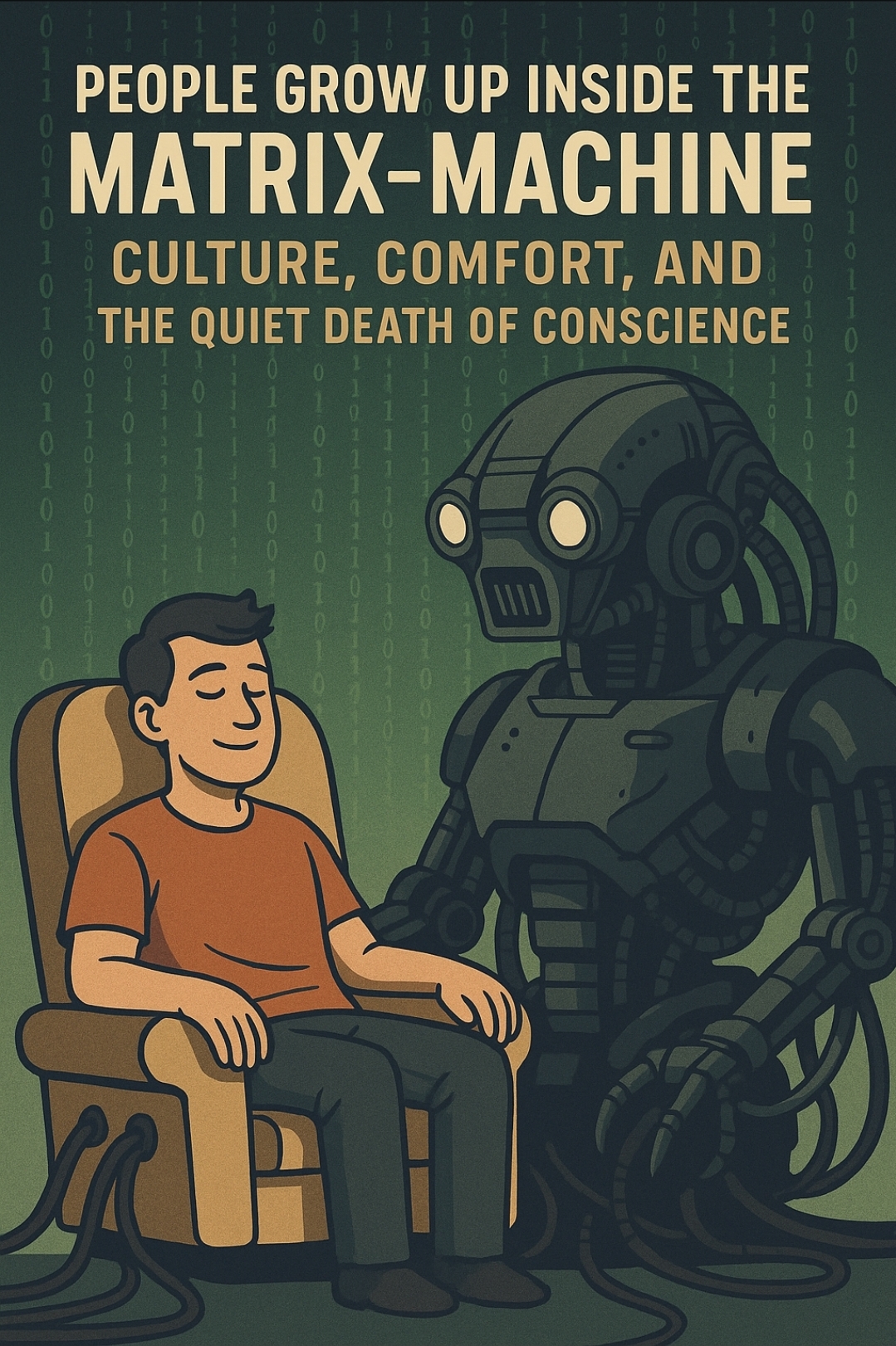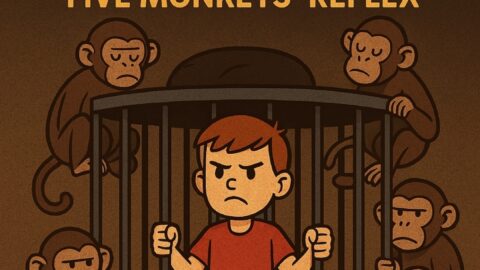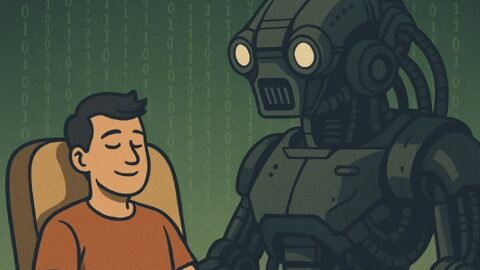Most of us internalize the culture we’re born into without noticing its incentives or manipulations. Culture doesn’t announce itself as programming—it disguises itself as “normal.” From the earliest age, we absorb assumptions about what is valuable, what is respectable, what is safe, and what is taboo. These assumptions aren’t neutral; they’re crafted and reinforced by institutions—schools, media, entertainment, politics—that reward compliance and punish questioning. By the time we’re adults, we rarely pause to ask whether the framework itself is corrupt, we simply live inside it as if it were the natural order.
Now add the “Red Button”: the human tendency to choose comfort, pleasure, or convenience over the hard voice of conscience. Every time we press it (it is similar to a drug), we train ourselves to favor the immediate hit of ease rather than the long-term fruit of truth. The more we reach for that button, the weaker our moral muscles become. Over time, we don’t just tolerate lies—we crave them, because they’re easier to swallow than the demands of integrity.
When cultural manipulation (the invisible script) combines with the Red Button (the habit of choosing comfort), the result is a society that steadily trades truth for ease. People no longer ask, “Is this good? Is this right?” They ask instead, “Does this make me feel safe, comfortable, accepted?” The drift is subtle at first, but deadly in the long run: courage erodes, conscience dulls, and an entire generation can be led away from truth without ever realizing it surrendered.
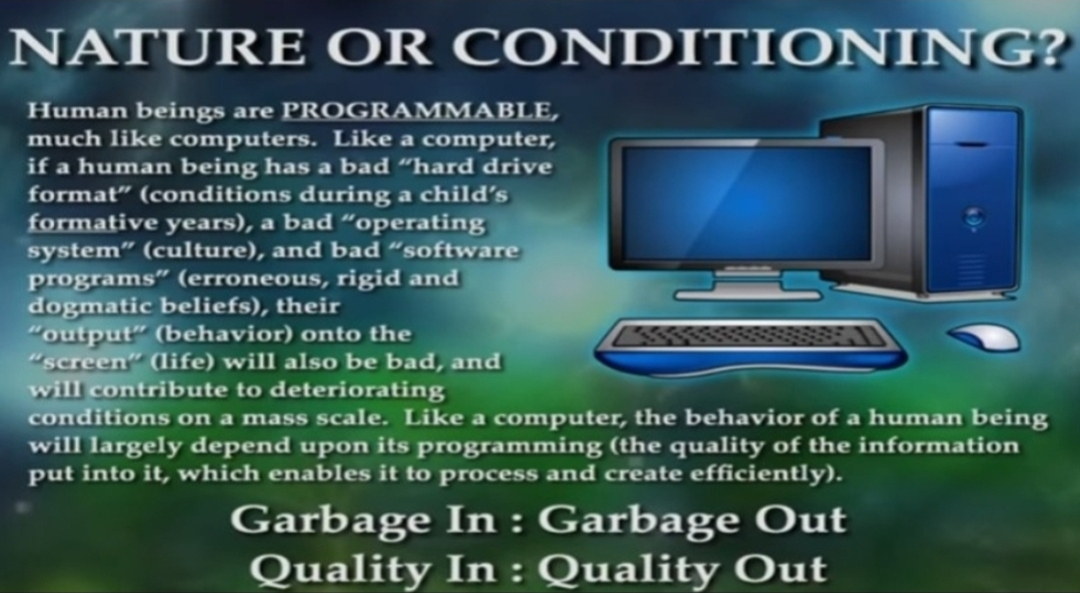
Part I — How Cultural Internalization Works (the Invisible Classroom)
We don’t enter the world with a blank slate. Almost from the moment we take our first breath, the culture around us begins to write on us—quietly, consistently, and almost invisibly. From our first screens and stories to the music, memes, and meals we choose, we start to consume—and, over time, we become what we consume; in a very real sense, We Are What We Consume. What feels like ‘common sense’ or ‘the way things are’ is often just the water we’re swimming in, never questioned because it surrounds us completely
1) Early scripting:
Before we ever make conscious choices, we inherit a map of reality from family, school, and media. We learn not only how to behave but what to value. Family norms tell us what’s “normal” in relationships, gender roles, or money. School routines teach us to sit in rows, obey bells, and equate performance with worth. Media cues set the tone for beauty, success, and authority. These scripts feel natural because they arrive before we have any framework to test them against.
2) Reward/punish loops: Culture enforces its boundaries with subtle reinforcements. When we conform—whether by dressing the right way, repeating the accepted phrases, or staying silent when dissent might cost us—we are rewarded with approval, status, or inclusion. When we question or resist, we meet friction: ridicule, exclusion, or even career punishment. The lesson sinks in quickly: go with the flow, and life is smoother; step outside it, and you’ll pay a price.
3) Narrative capture: Institutions simplify the messy complexity of life into packaged narratives: slogans, soundbites, curriculum modules, entertainment tropes. These stories aren’t necessarily true, but they’re safe, familiar, and easy to repeat. They give us the sense that we understand the world, while steering our imagination inside narrow lanes. Over time, we stop asking whether the narrative is accurate and simply operate within it.
4) Attention hijack: Modern platforms are not neutral—they are designed to exploit our psychology. Social media, advertising, and even news outlets optimize for stimulation, outrage, and novelty rather than wisdom, reflection, or truth. What is loud, flashy, and repetitive becomes “real,” even if it is shallow or distorted. Slowly, our sense of importance shifts: what trends feels more urgent than what endures.
5) Cost of dissent: To resist the cultural script is to risk losing belonging, status, and even livelihood. Speaking truth against the current narrative can cost friendships, jobs, or reputation. Because humans are deeply wired for acceptance, most people will keep their doubts private and their public behavior compliant. This social pressure ensures the system sustains itself without constant enforcement; silence is enough.
What emerges is a default operating system for life—a mental, moral, and emotional framework that feels natural but is not necessarily aligned with truth, justice, or long-term flourishing. It is inherited rather than chosen, absorbed rather than tested. Unless we deliberately examine and rewrite this programming, we live as products of our culture rather than as free agents of conscience.
Part II — The Red Button: Comfort vs. Conscience
The Red Button is not a physical object—it’s a metaphor for the easiest path, the shortcut that promises instant relief while quietly eroding our integrity. It shows up in moments of tension when conscience tugs one way but comfort pulls another. In those moments, pressing the Red Button feels harmless, even sensible. Yet over time, the habit of choosing comfort over conscience becomes a way of life, reshaping our character and hollowing out our culture.
1) Say nothing when something should be said.
The Red Button often takes the form of silence. When we see dishonesty, corruption, or cruelty, we feel a nudge to speak—but silence keeps us safe. Each time we swallow our words, the Red Button rewards us with short-term peace. Yet this peace is counterfeit. By refusing to speak, we allow falsehood to grow stronger and truth to retreat.
2) Click outrage instead of thinking.
The Red Button tempts us with quick emotional hits—anger, indignation, tribal loyalty—because outrage feels easier than careful thought. Clicking on whatever confirms our bias spares us the discomfort of wrestling with nuance. But this habit dulls discernment. We stop asking, “Is this true?” and start asking only, “Does this make me feel right?”
3) Numb anxiety with shopping, scrolling, or status-chasing.
The Red Button offers distraction as medicine. Shopping for things we don’t need, scrolling endlessly through feeds, or chasing the appearance of success—these activities keep unease at bay for a moment. But they never resolve the root cause. Instead, they deepen emptiness, because what was avoided grows in the shadows.
4) Justify tiny compromises “for now.”
Perhaps the most dangerous form of the Red Button is rationalization. “It’s just this once.” “It’s not a big deal.” “Everyone else does it.” These tiny concessions feel harmless in the moment. But compromise accumulates. What begins as bending once becomes bending often, until conscience becomes so quiet it feels absent.
The Spiritual Cost
- What it looks like: Conscience grows faint; prayer or reflection feels hollow; truth becomes uncomfortable rather than illuminating.
- Consequence: The soul becomes numb to conviction. Instead of seeking light, a person hides from it. God’s voice (or higher moral calling) is reduced to background noise.
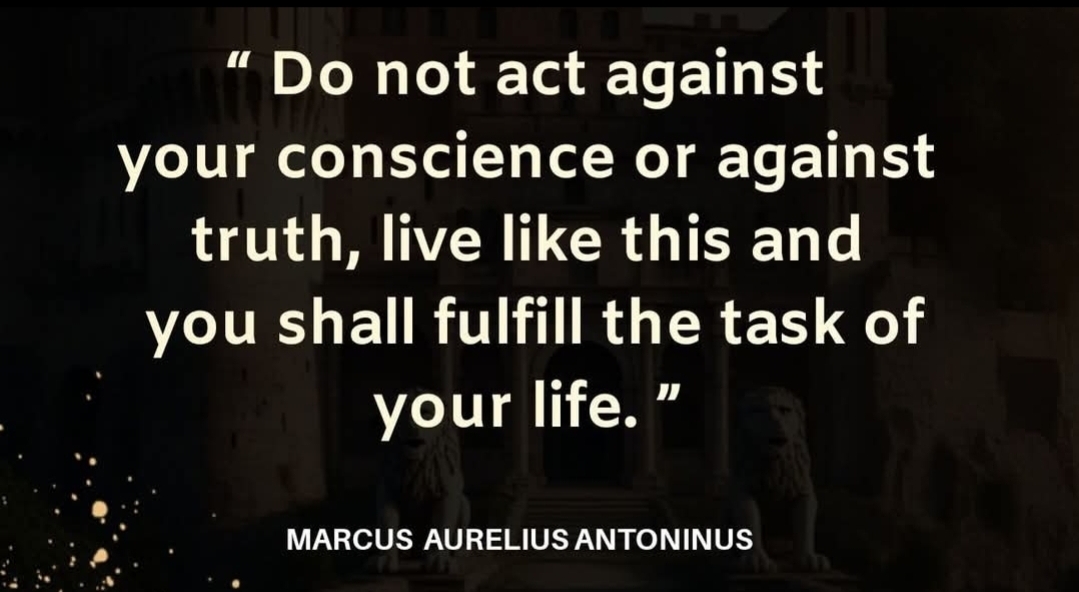
The Emotional Cost
- What it looks like: At first there’s relief (“I avoided conflict”), but later guilt, shame, or low-grade anxiety sets in.
- Consequence: Emotional resilience weakens. Over time, people experience inner conflict, self-disgust, or numbness, because integrity and action are out of alignment.
The Moral Cost
- What it looks like: The definition of “right” and “wrong” shifts. Lines that once felt firm become blurry. Situations are judged by convenience, not principle.
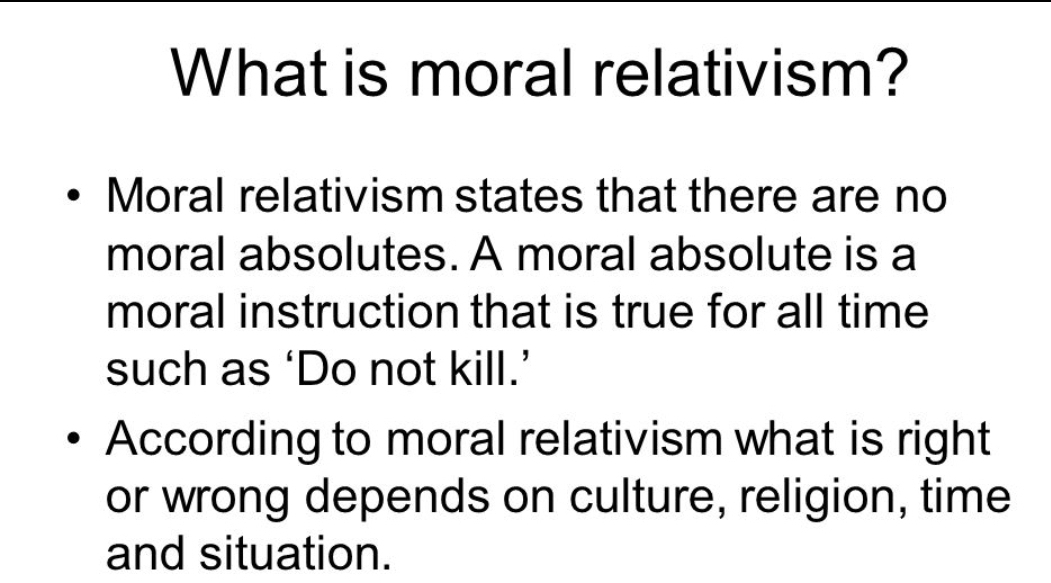
- Consequence: Moral compass tilts toward self-preservation. What once would have been unthinkable becomes acceptable, even normal.
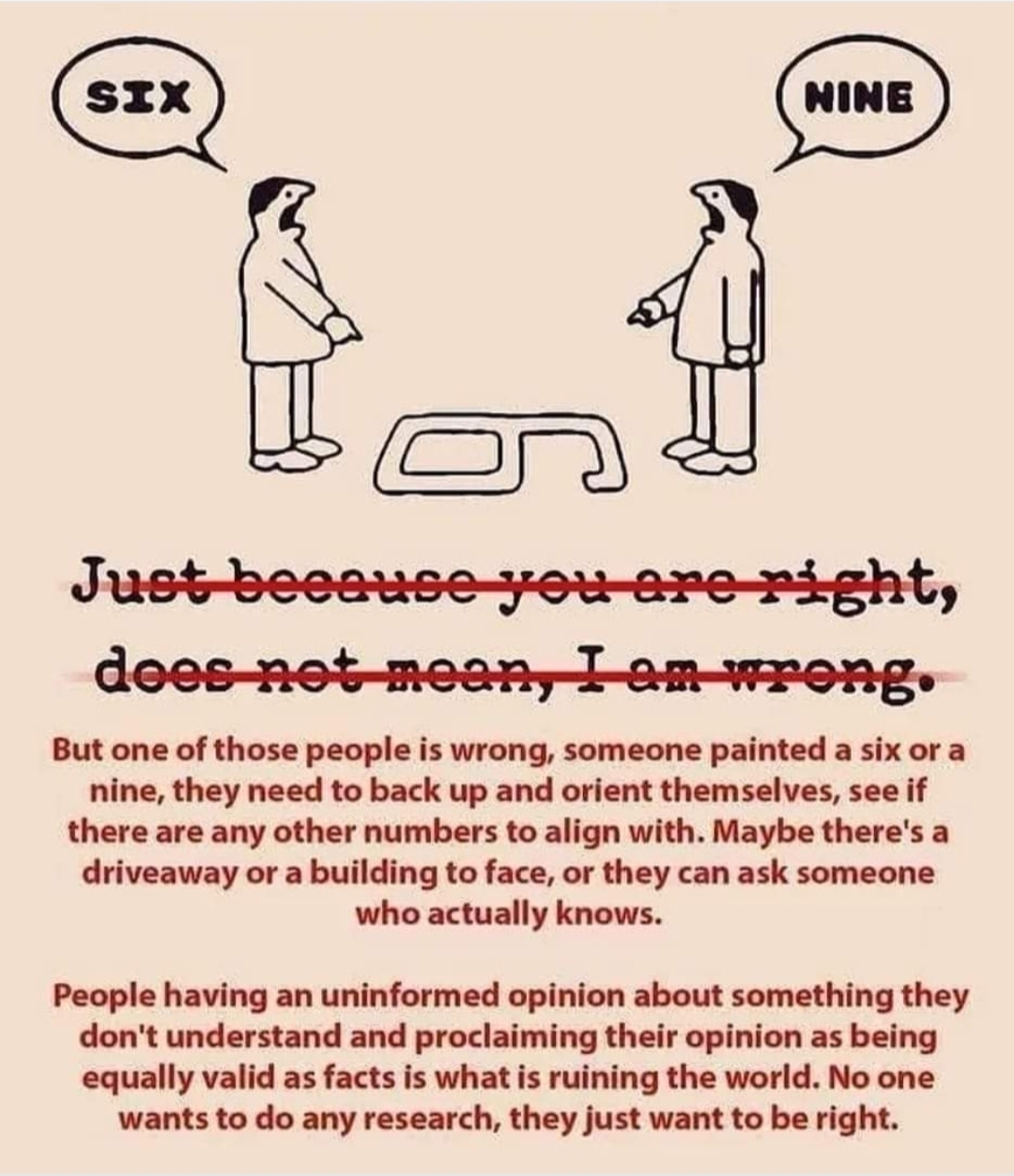
The Psychological Cost
- What it looks like: Rationalizations pile up: “It’s not me, it’s the system” … “I’ll change later.” Cognitive dissonance becomes a steady companion.
- Consequence: Integrity fracture leads to stress, defensiveness, and projection. To keep self-image intact, the mind builds walls of denial, making real growth even harder.

The Physical Cost
- What it looks like: The body keeps the score. Stress hormones spike when we betray our conscience; sleep is restless, habits slip, energy drops.
- Consequence: Compromise wears down health. Small shortcuts—overeating, skipping exercise, ignoring rest—mirror the deeper pattern of choosing ease over discipline.
The slippery slope:
Every press of the Red Button lowers the resistance to pressing it again. The nervous system learns the path of least resistance. The conscience, once sharp and insistent, becomes faint and inconvenient. Comfort becomes the louder voice. In time, individuals—and whole societies—lose the ability to endure discomfort for the sake of truth. At that point, the Red Button doesn’t even need to be pressed; it presses itself, because the habit has become second nature.
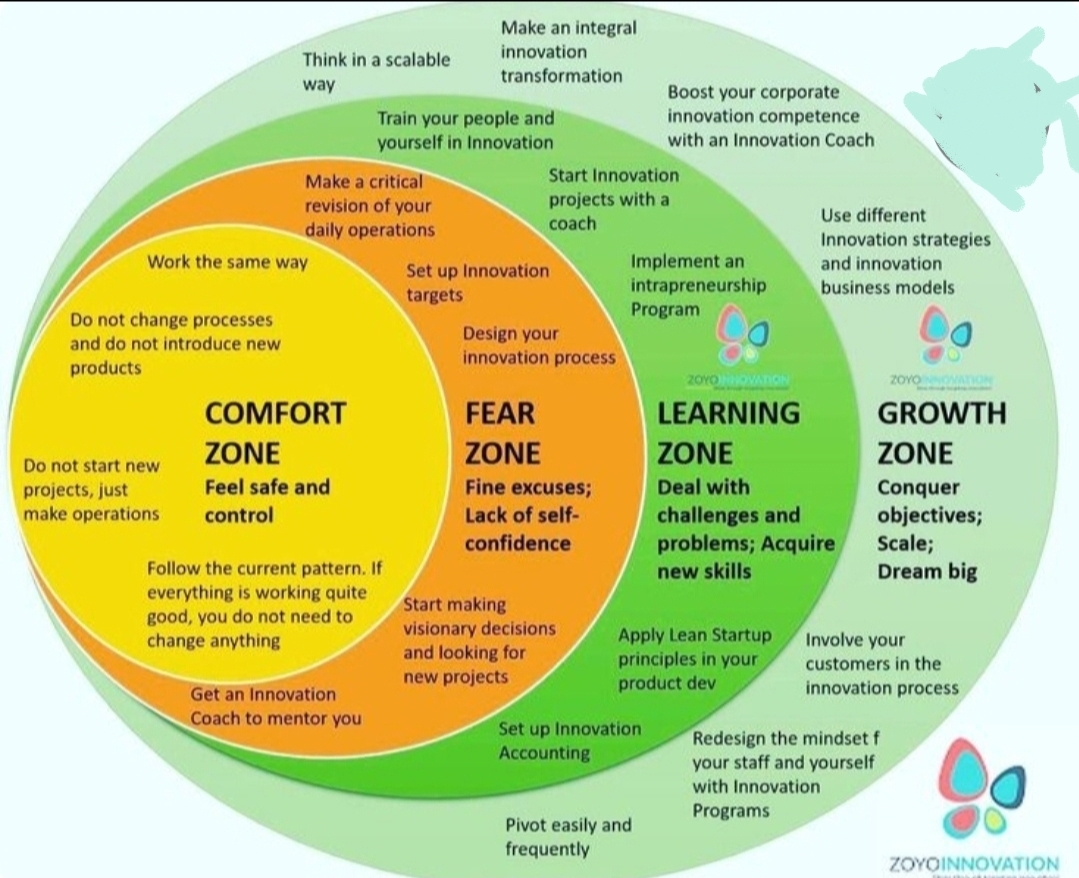
Tiny compromises may feel like survival tactics, but in reality they degrade every layer of the self. Spiritually, they muffle truth. Emotionally, they breed unrest. Morally, they move the goalposts. Psychologically, they distort reality. Physically, they take a toll on the body. The danger is not the single press of the Red Button—it’s the way repeated presses reshape the whole person until compromise feels like character.
The cost:
The immediate reward is relief, but the long-term cost is the erosion of courage, clarity, and moral strength. A people who always reach for comfort cannot defend truth when it matters. They will trade liberty for security, dignity for distraction, and integrity for acceptance. The Red Button seems small in each press, but collectively it can destroy a civilization.
Between the cost and the gain lies a choice point—a fork in the road that confronts every person and every culture. Compromise and comfort appear easier in the moment, but they hollow out the foundation of the self. Resistance and conscience appear harder at first, but they strengthen every dimension of life. Both paths are cumulative: small choices repeated over time shape not just habits, but identity.
What begins as tiny compromises can quietly mold a character of weakness. Yet the opposite is also true: small acts of faithfulness forge a character of strength. Just as repeated presses of the Red Button teach the body, mind, and soul to surrender, repeated acts of courage train the whole person to endure. Over years, the gap widens until one life is marked by erosion and despair while another is marked by clarity and peace.
The question is not whether the Red Button is real—it is whether we will keep pressing it or learn to resist it. For the same mechanism that leads to decay can also lead to renewal: habits. Where compromise multiplies cost, conscience multiplies gain.
The Spiritual Gain
- What it looks like: Conscience grows sharper; prayer or reflection feels alive and convicting; truth becomes a source of strength instead of fear.
- Benefit: The soul learns to hunger for light. A person senses God’s presence (or higher moral order) more clearly, and obedience feels natural rather than burdensome.
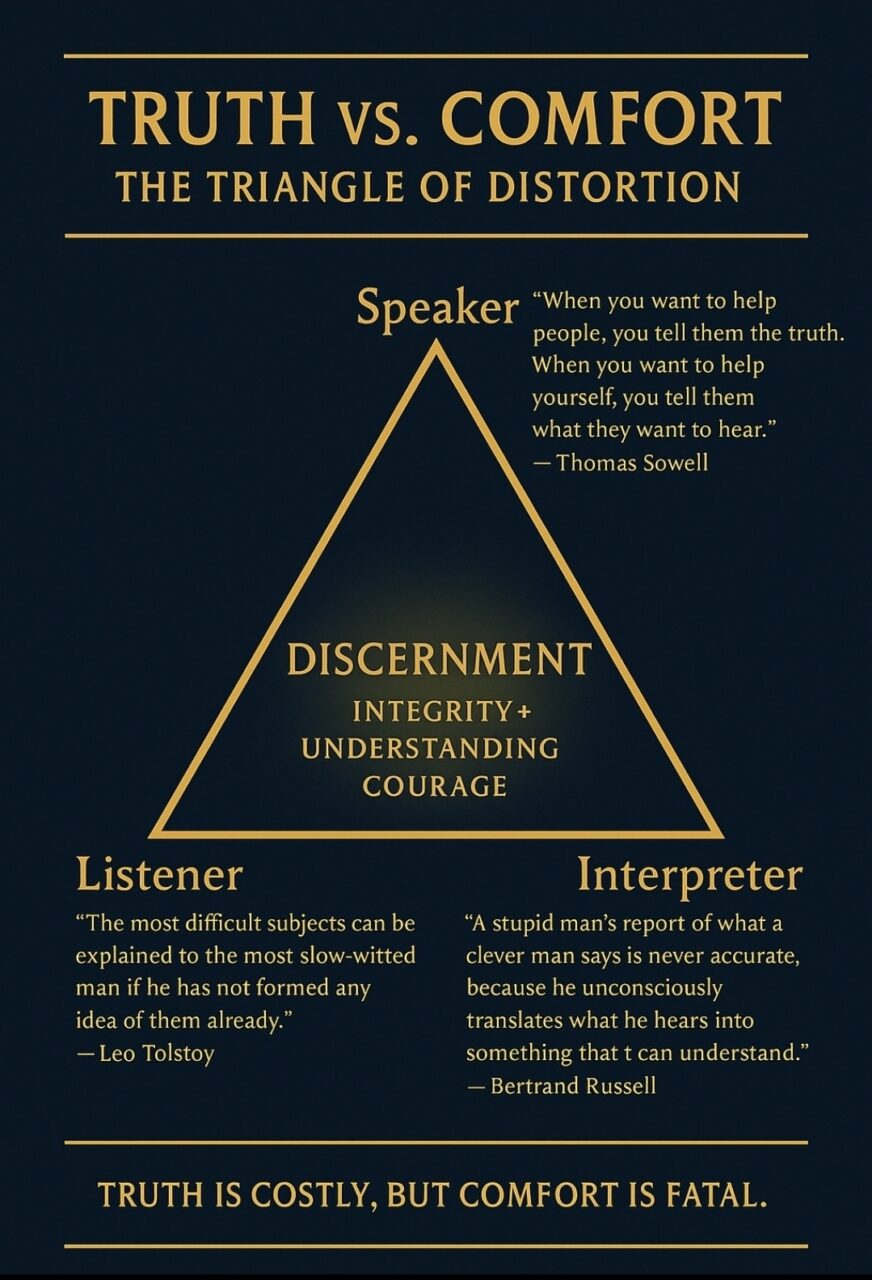
The Emotional Gain
- What it looks like: Instead of short-term relief followed by guilt, there is deep satisfaction and peace. Even when hard, the act of standing firm brings emotional stability.
- Benefit: Greater resilience. Confidence grows as emotions align with truth, reducing cycles of anxiety, shame, or regret.
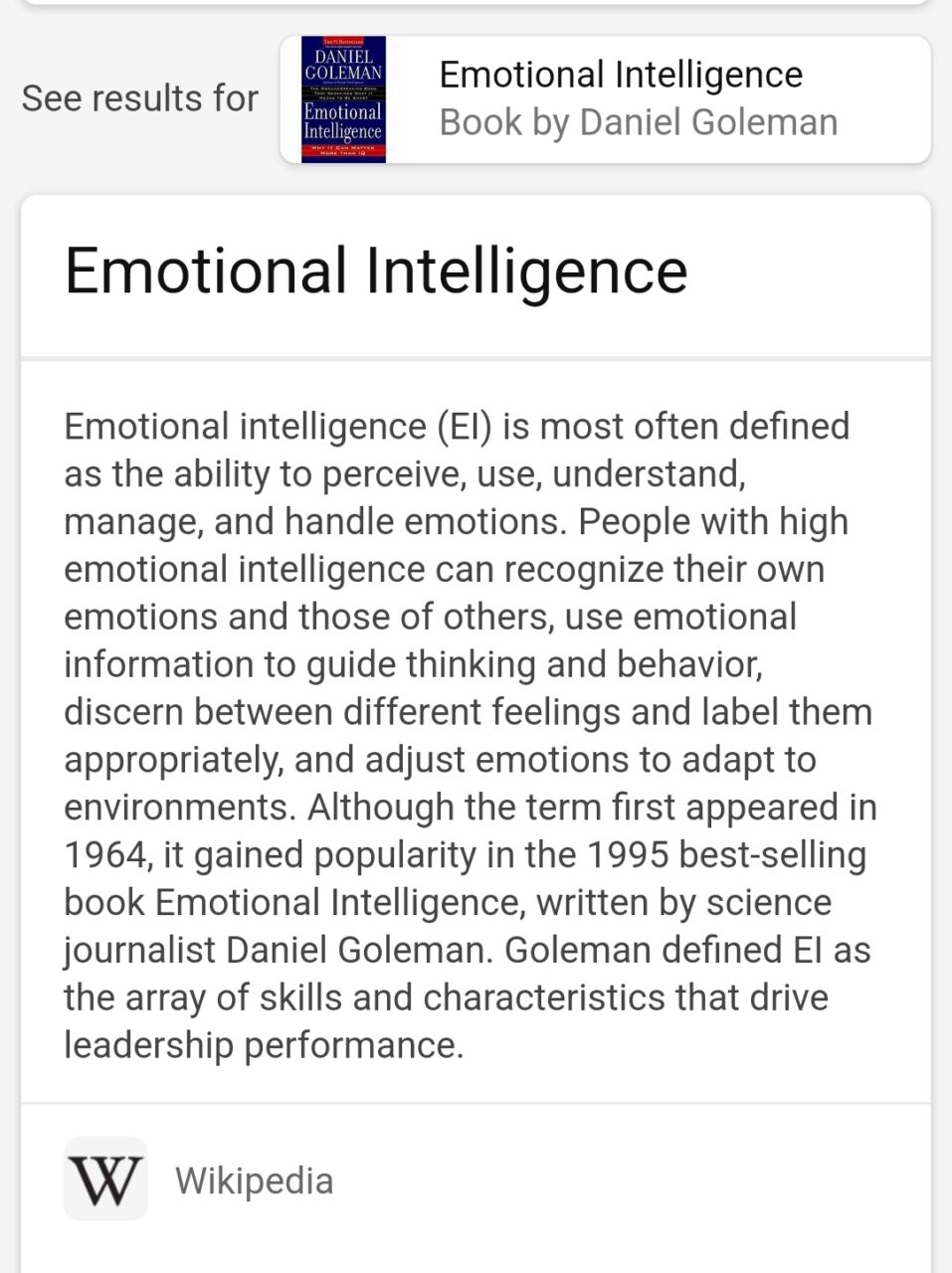
The Moral Gain
- What it looks like: Each choice to do what is right reinforces moral clarity. Boundaries grow stronger, not weaker. “Right” and “wrong” stay anchored in principle.
- Benefit: A trustworthy moral compass. Over time, a person develops integrity that others can sense and rely on.

The Psychological Gain
- What it looks like: The mind is free from the burden of rationalizations and denial. Cognitive dissonance fades, replaced with coherence between belief and action.
- Benefit: Stronger self-respect and clearer thinking. With less inner conflict, the mind has more energy for creativity, problem-solving, and discernment.
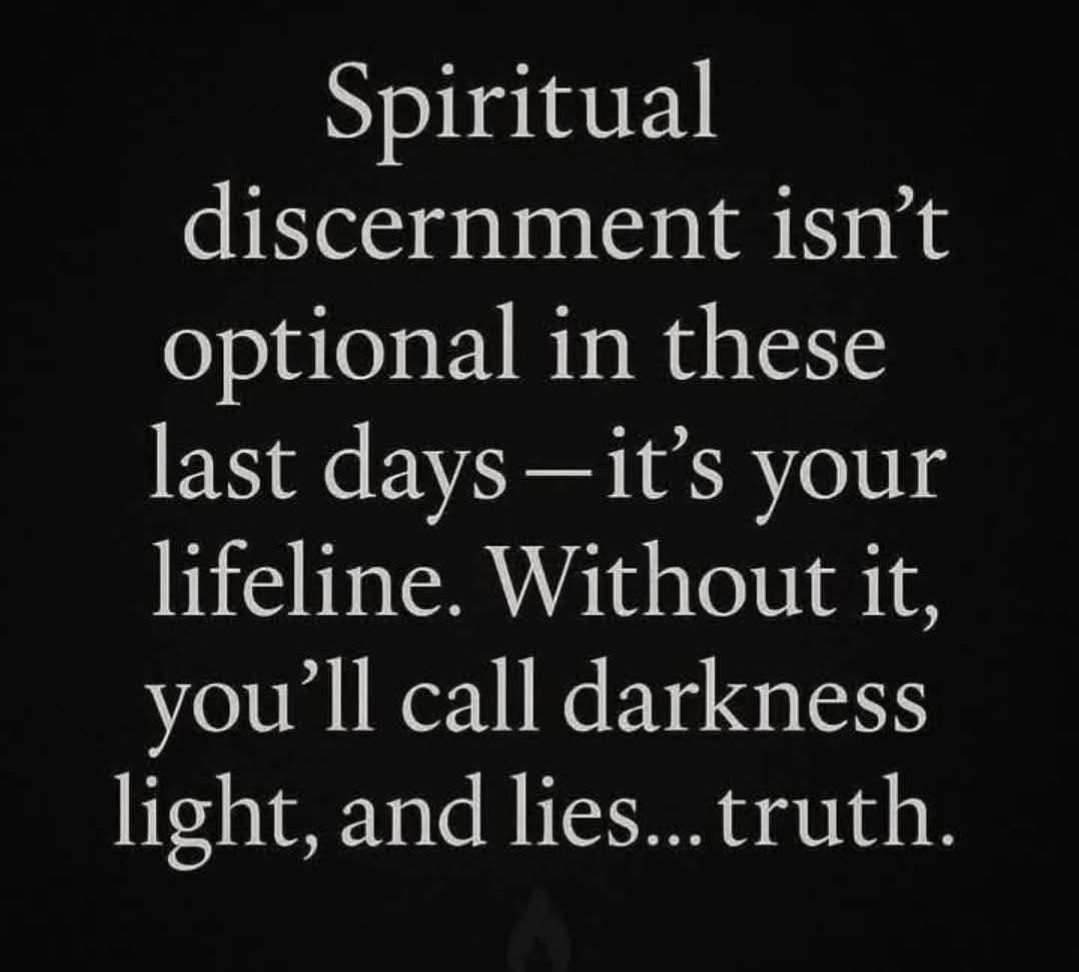
The Physical Gain
- What it looks like: The body reflects the peace of alignment. Stress hormones drop; sleep and energy improve; habits of discipline ripple into diet, exercise, and rest.
- Benefit: Physical vitality reinforces moral and emotional strength. The body no longer bears the weight of compromise, but of freedom.
Takeaway: Resisting the Red Button is not just about one hard choice—it’s about building a life where spiritual vitality, emotional peace, moral clarity, psychological strength, and physical health all reinforce one another. Each act of conscience strengthens the next, until courage becomes second nature.
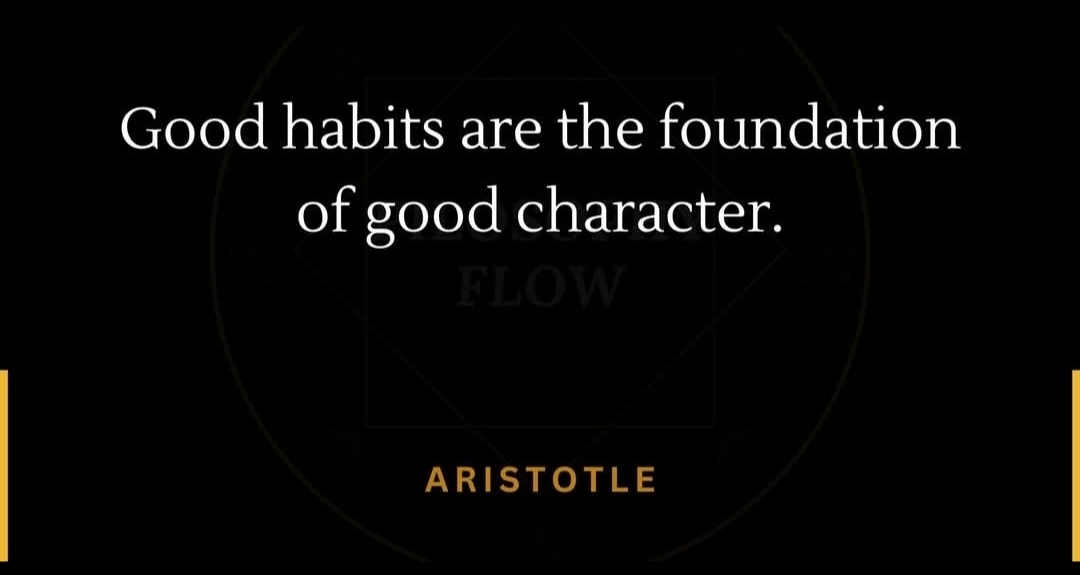
Part III — The Deadly Allure (Six Traps and How They Work)
The Red Button doesn’t just whisper once—it sets up a whole marketplace of temptations. Each of these traps offers a different flavor of immediate relief while carrying the same long-term poison: the erosion of conscience, clarity, and courage.
1) Comfort
- Mechanism: Short-term relief from discomfort → avoidance habits → learned helplessness.
- Signals: Procrastination, “I’ll deal with it later,” endless entertainment.
- Cost: Courage atrophies; problems compound.
2) Pleasure
- Mechanism: Dopamine capture (food, porn, novelty, likes) → tolerance → escalation.
- Signals: Mood swings tied to stimuli; constant search for “next hit”; boredom with ordinary life.
- Cost: Meaning hollows out; relationships shrink into utilities for gratification.
3) Boredom (the silent accelerant)
- Mechanism: When life feels empty or unstimulating, the mind demands novelty. Without deeper purpose, we interpret quiet or stillness as failure, not opportunity. This drives the restless search for stimulation.
- Signals: Irritability in silence; compulsive phone-checking; inability to sit still without distraction.
- Cost: The soul forgets how to wait, reflect, and grow. Boredom turns into an incubator for bad habits, because distraction becomes easier than discipline. Instead of birthing creativity or prayer, the stillness of life is filled with noise.
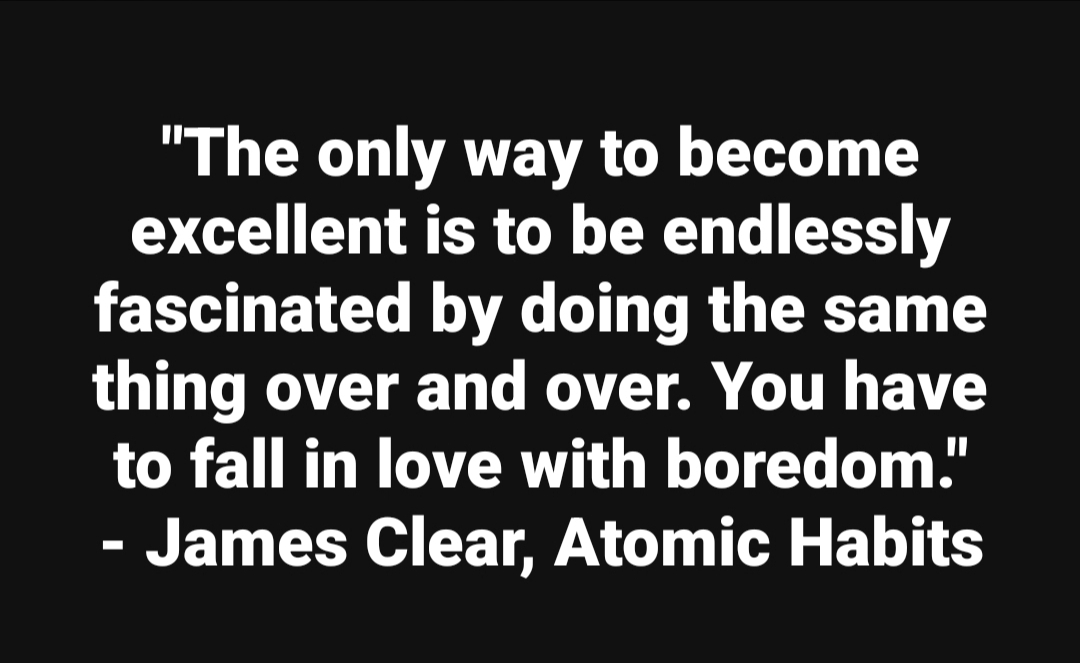
4) Materialism
- Mechanism: Identity = possessions → debt-fueled status → fragility.
- Signals: “I’ll be happy when…,” clutter, financial stress, envy of others’ lifestyle.
- Cost: Time and attention migrate from people to things; joy and security become hostage to economic winds.
5) Pride/Ego
- Mechanism: Self-image defense → confirmation bias → moral blindness.
- Signals: Inability to admit fault; tribal chanting; contempt for out-groups.
- Cost: Repentance and growth become impossible; conflict hardens into hostility.
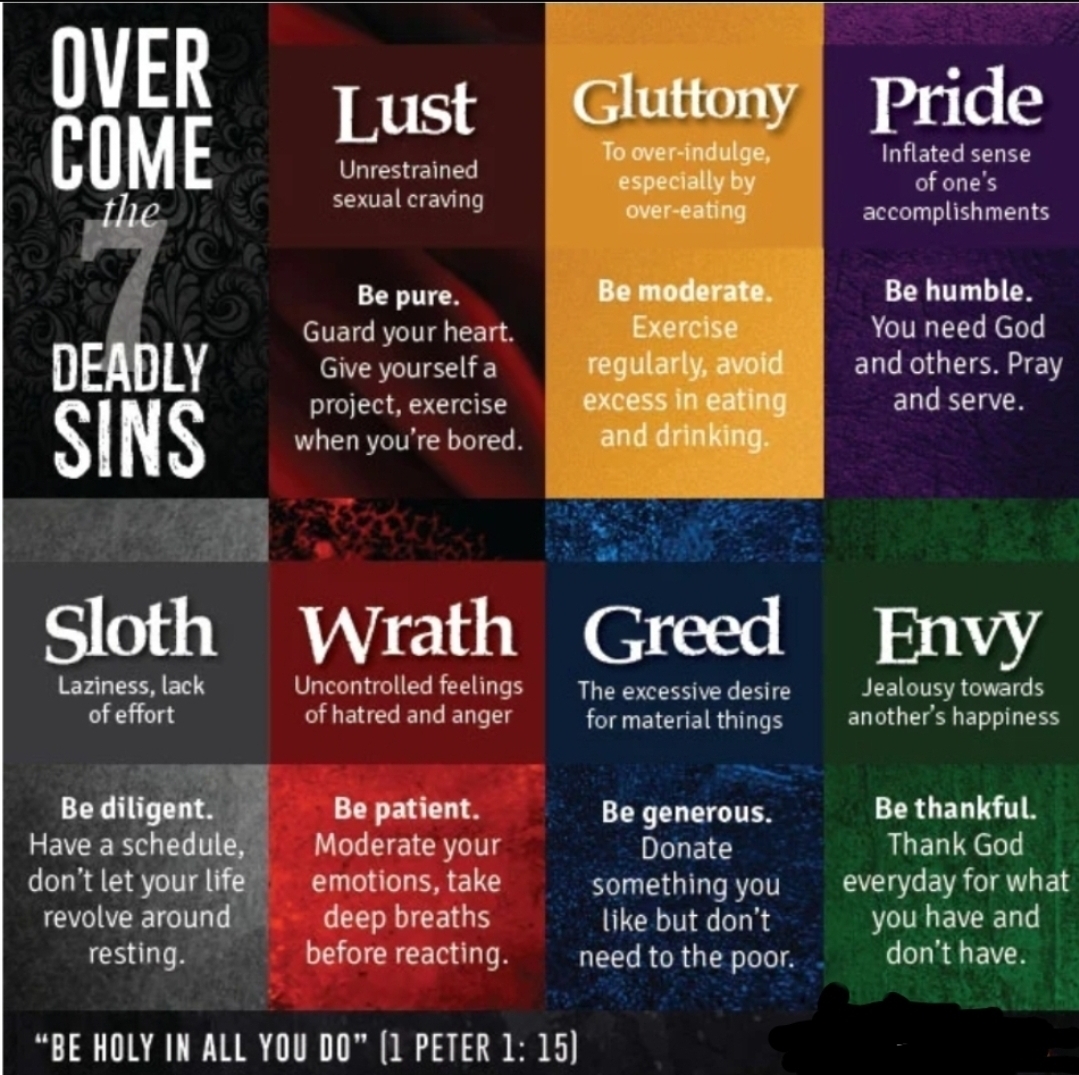
6) Nihilism
- Mechanism: Meaning collapse → “nothing matters” → impulse rule.
- Signals: Cynical humor as armor; paralysis in decision-making; reckless thrill-seeking.
- Cost: Duty and love lose gravity; despair spreads like a contagion.
7) Cultural Manipulation (the Solvent)
- Mechanism: Gatekeepers monetize and amplify every other trap; manipulation masquerades as normal life. Comfort is advertised, pleasure is industrialized, boredom is filled with distractions, materialism is glorified, pride is weaponized, nihilism is normalized.
- Signals: Manufactured “emergencies,” curated binaries, moving moral goalposts, slogans that replace thought.
- Cost: A populace easy to steer—away from conscience, toward compliance. What was once chosen freely becomes enforced silently.
Part IV — The Feedback Engine (Why It Keeps Getting Worse)
- Media rewards outrage and novelty → attention debt.
- Tech personalizes temptation → micro-addictions.
- Economy monetizes distraction and debt → dependency.
- Politics exploits fear/tribe → permission for overreach.
- Academia/Edutainment replaces inquiry with ideology → brittle minds.
Part V — Consequences If Unchecked
- Individual: Anxiety, addiction to stimulation, moral drift.
- Family: Fragmented bonds; children raised by screens and schedules.
- Community: Polarization, low trust, “performative” compassion.
- Institutions: Compliance over competence; rule by narrative.
- Spiritual: Numb conscience; truth treated as optional or “offensive.”
Part VI — The Counter-Strategy: From Comfort to Conscience
A) Personal (30–60 days)
- Daily truth window (20–40 min): Scripture or classic moral text + handwritten reflection.
- Friction fast: Remove one Red Button source (e.g., social media app) for 30 days.
- Courage rep: One honest, difficult action per day (apology, boundary, witness).
- Body discipline: Sleep before 10:30; whole food baseline; 30 minutes of movement.
- Silence & solitude (10 min): Train discomfort tolerance; notice cravings without obeying.
B) Household Protocols
- Tech commons: Devices docked in one area; no phones at table/bedroom.
- Shared learning: Weekly family “seminar” (history, logic, fallacies, biography).
- Meaning rituals: Sabbath/rest day, service project, shared prayer.
- Budget integrity: No unsecured consumer debt; tithe/give first; save second.
C) Community Playbook
- Small circles (4–8 people): Truth + accountability + skills (first aid, gardening, trades).
- Parallel institutions: Independent school co-ops, local business networks, mutual aid.
- Cultural production: Host salons, reading groups, music nights; elevate beauty and craft.
- Civic sunlight: Demand single-subject bills, posted votes, and public read times.
D) Institutional Guardrails
- Speech-first charters: Protect dissent; ban compelled speech.
- Clear authority, clear audits: Publish rules, budgets, metrics.
- No omnibus: One policy, one bill, one page if possible.
- Due process everywhere: From HR to city council; no punishment without evidence.
Part VII — The Red Button Replacement: Habit Loops That Favor Conscience
- Cue: Anxiety or boredom.
- Craving: Relief.
- Default behavior: Scroll, snack, shop, snipe.
- New behavior: 90-second pause → breathe slowly → name the value at stake → tiny, value-aligned action (send the hard message, read one page, take a 5-minute walk, pray).
- Reward: Track streaks; celebrate integrity, not outcomes.
Part VIII — Metrics That Matter (Are We Healing?)
- Screen time ↓; long-form reading hours ↑
- Debt ↓, emergency savings ↑
- Family meals/week ↑; phone-free hours ↑
- Local friendships/co-ops formed ↑
- Acts of service/month ↑
- “Hard conversations” completed ↑
- Rest/sleep regularity ↑
Part IX — Conversations That Re-Open Conscience (Prompts)
- “Where am I pressing the Red Button this week?”
- “What truth am I avoiding because it will cost me?”
- “How has my culture shaped me for good—and for drift?”
- “What would I do if I weren’t afraid of losing status?”
- “Which comfort can I trade for one act of courage today?”
Conclusion: Choose Weight Over Warmth
A free, decent society is built by people who prefer weight over warmth—the weight of truth, duty, and love over the warm bath of distraction. Culture will always try to script us; comfort will always offer the Red Button. The way back isn’t rage or withdrawal—it’s a million small acts of conscience that, together, become a new culture.

